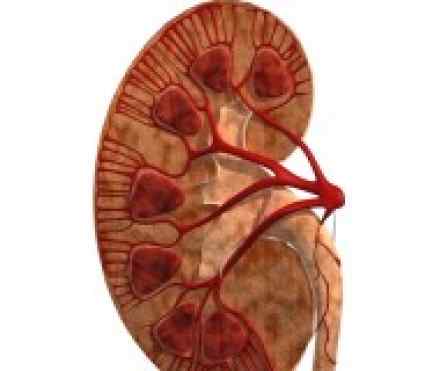
What is it?
Kidney cancer is cancer that originates in the kidneys. Your kidneys are two bean-shaped organs, each about the size of your fist. They are located behind your abdominal organs, with one kidney on each side of your spine.
In adults, the most common type of kidney cancer is renal cell carcinoma. Other less common types of kidney cancer can occur. Transitional cell carcinoma, which affects the ureters, can also begin in the kidneys. Children are more likely to develop a kind of kidney cancer called Wilms' tumor.
The incidence of kidney cancer seems to be increasing, though it isn't clear why. Many kidney cancers are detected during procedures for other diseases or conditions. Imaging techniques such as computerized tomography (CT) are being used more often, which may lead to the discovery of more kidney cancers.
Symptoms
Kidney cancer rarely causes signs or symptoms in its early stages. In the later stages, kidney cancer signs and symptoms may include:
- Blood in your urine, which may appear pink, red or cola colored
- Back pain just below the ribs that doesn't go away
- Weight loss
- Fatigue
- Intermittent fever
Causes
It's not clear what causes renal cell carcinoma. Doctors know that kidney cancer begins when some kidney cells acquire mutations in their DNA. The mutations tell the cells to grow and divide rapidly. The accumulating abnormal cells form a tumor that can extend beyond the kidney. Some cells can break off and spread (metastasize) to distant parts of the body.
Risk factors
Factors that can increase the risk of kidney cancer include:
- Older age. Your risk of kidney cancer increases as you age.
- Being male. Men are more likely to develop kidney cancer.
- Smoking. Smokers have a greater risk of kidney cancer than nonsmokers do. The risk decreases after you quit.
- Obesity. People who are obese have a higher risk of kidney cancer than do people who are considered average weight.
- High blood pressure (hypertension). High blood pressure increases your risk of kidney cancer, but it isn't clear why.
- Chemicals in your workplace. Workers who are exposed to certain chemicals on the job may have a higher risk of kidney cancer. People who work with chemicals such as asbestos and cadmium may have an increased risk of kidney cancer.
- Treatment for kidney failure. People who receive long-term dialysis to treat chronic kidney failure have a greater risk of developing kidney cancer. Von Hippel-Lindau disease. People with this inherited disorder are likely to develop several kinds of tumors, including, in some cases, kidney cancer.
- Hereditary papillary renal cell carcinoma. Having this inherited condition makes it more likely you'll develop one or more kidney cancers.
Diagnosis
Diagnosing kidney cancer
Tests and procedures used to diagnose kidney cancer include:
- Blood and urine tests. Tests of your blood and your urine may give your doctor clues about what's causing your signs and symptoms.
- Imaging tests. Imaging tests allow your doctor to visualize a kidney tumor or abnormality. Imaging tests might include ultrasound, computerized tomography (CT) or magnetic resonance imaging (MRI).
- Removing a sample of kidney tissue (biopsy). In very selected cases, your doctor may recommend a procedure to remove a small sample of cells (biopsy) from a suspicious area of your kidney. Because surgery is usually the first line treatment for kidney cancer and a kidney biopsy carries the risk of a "false-negative," doctors usually forgo kidney biopsy. Kidney biopsy is typically reserved for cases that are most likely to be noncancerous or for people who can't undergo an operation.
Kidney cancer staging
Once your doctor diagnoses kidney cancer, the next step is to determine the extent, or stage, of the cancer. Staging tests for kidney cancer may include additional CT scans or other imaging tests your doctor feels are appropriate.
Then your doctor assigns a number, called a stage, to your cancer. Kidney cancer stages include:
- Stage I. At this stage, the tumor can be up to 2 3/4 inches (7 centimeters) in diameter. The tumor is confined to the kidney.
- Stage II. A stage II kidney cancer is larger than a stage I tumor, but is still confined to the kidney.
- Stage III. At this stage, the tumor extends beyond the kidney to the surrounding tissue or the adrenal glands, and may also have spread to a nearby lymph node.
- Stage IV. Cancer spreads outside the kidney, to multiple lymph nodes or to distant parts of the body, such as the bones, brain, liver or lungs.
References
http://www.nhs.uk/conditions/Cancer-of-the-kidney/Pages/Introduction.aspx
http://www.medicinenet.com/kidney_cancer/article.htm
http://www.webmd.com/cancer/understanding-kidney-cancer
http://www.drugs.com/health-guide/kidney-cancer.html
http://www.cancer.ie/cancer-information/kidney-cancer#sthash.lw5gQTIa.dpbs





